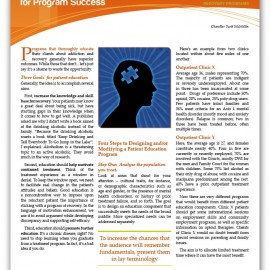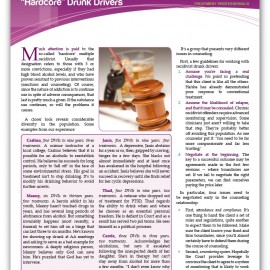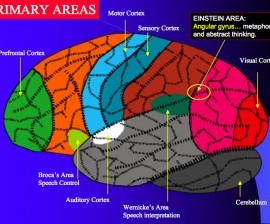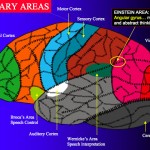Treatment
Patient Education: Powerful Tool for Program Success
A key breakthrough for recovering clients: The realization that, while they cannot control their disease, they can do a lot about their own recovery.
Topics: clinical management, patient education, program development
Counseling Challenge: “Hardcore” Drunk Drivers
Repeat DUI/DWI offenders can pose tough challenges for treatment programs and counselors. The needs of the client and the demands of the legal system don’t always work together.
Topics: addicted offenders, client engagement and motivation, compliance and noncompliance, counseling skills, DUI/DWI, leverage
A Model of Mental Illness
It may help in understanding how the problems that plague some of us throughout life may have come about. And hopefully, in doing so, remove a bit the shame and stigma that often accompanies such problems.
Topics: co-occurring disorders, mental illness, stigma, trauma
Three Basic Questions
Diabetics and heart patients are asked to make changes in lifestyle to reduce the risk of future crisis. Therapy is sometimes used to support those changes.
Topics: co-occurring disorders, mental illness
Treatment Outcomes: Does it Work?
Our longstanding practice of branding anyone who drank again a ‘failure’ kept us from recognizing very real success right under our noses.
Topics: abstinence, mortality, outcomes, prognosis, relapse, research
Waiting (and Waiting…) for Inpatient Beds
If your inpatient provider determines eligibility using ASAM patient placement criteria, don’t forget to describe the patient’s need in those terms. Makes your case a little stronger by making their job a little easier.
Topics: clinical management, inpatient treatment, outpatient treatment, referral
Shopping for Treatment
Current research suggests that an optimal treatment episode is in the neighborhood of three months. That doesn’t mean it must be all in residence.
Topics: family involvement, finding the right treatment, getting help, referral
Engaging Coerced DUI Clients
First, they don’t understand why they’re in treatment, or how it could possibly benefit them. Second, they’re ticked off about having been coerced.
Topics: addicted offenders, client engagement and motivation, client types and needs, DUI/DWI, groups, legal problems
Can We Make Patient Education Work?
Use examples. It’s hard for someone with alcoholism to grasp the idea that he or she can’t go back to drinking at some future point – after a year of abstinence, for instance. But the old saw that a pickle can’t go back to being a cucumber – that people seem to understand.
Topics: client engagement and motivation, patient education, self diagnosis


















